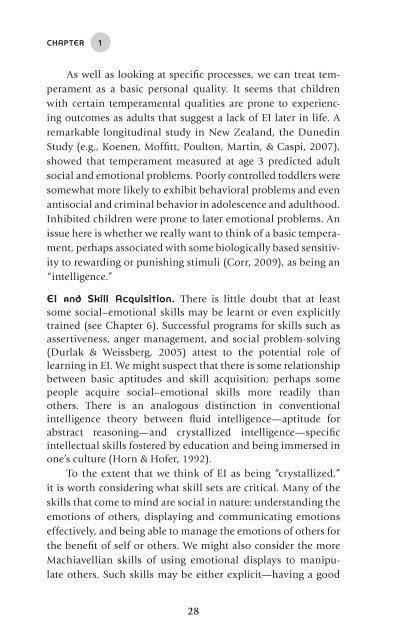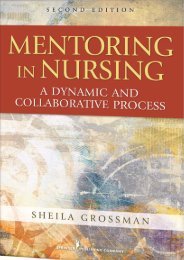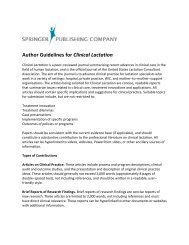Untitled - Springer Publishing
Untitled - Springer Publishing
Untitled - Springer Publishing
Create successful ePaper yourself
Turn your PDF publications into a flip-book with our unique Google optimized e-Paper software.
CHAPTER 1<br />
As well as looking at specific processes, we can treat temperament<br />
as a basic personal quality. It seems that children<br />
with certain temperamental qualities are prone to experiencing<br />
outcomes as adults that suggest a lack of EI later in life. A<br />
remarkable longitudinal study in New Zealand, the Dunedin<br />
Study (e.g., Koenen, Moffitt, Poulton, Martin, & Caspi, 2007),<br />
showed that temperament measured at age 3 predicted adult<br />
social and emotional problems. Poorly controlled toddlers were<br />
somewhat more likely to exhibit behavioral problems and even<br />
antisocial and criminal behavior in adolescence and adulthood.<br />
Inhibited children were prone to later emotional problems. An<br />
issue here is whether we really want to think of a basic temperament,<br />
perhaps associated with some biologically based sensitivity<br />
to rewarding or punishing stimuli (Corr, 2009), as being an<br />
“intelligence.”<br />
EI and Skill Acquisition. There is little doubt that at least<br />
some social–emotional skills may be learnt or even explicitly<br />
trained (see Chapter 6). Successful programs for skills such as<br />
assertiveness, anger management, and social problem-solving<br />
(Durlak & Weissberg, 2005) attest to the potential role of<br />
learning in EI. We might suspect that there is some relationship<br />
between basic aptitudes and skill acquisition; perhaps some<br />
people acquire social–emotional skills more readily than<br />
others. There is an analogous distinction in conventional<br />
intelligence theory between fluid intelligence—aptitude for<br />
abstract reasoning—and crystallized intelligence—specific<br />
intellectual skills fostered by education and being immersed in<br />
one’s culture (Horn & Hofer, 1992).<br />
To the extent that we think of EI as being “crystallized,”<br />
it is worth considering what skill sets are critical. Many of the<br />
skills that come to mind are social in nature: understanding the<br />
emotions of others, displaying and communicating emotions<br />
effectively, and being able to manage the emotions of others for<br />
the benefit of self or others. We might also consider the more<br />
Machiavellian skills of using emotional displays to manipulate<br />
others. Such skills may be either explicit—having a good<br />
28<br />
Matthews_PTR_Ch 01_12-10-11_1-42.indd 28<br />
10/12/2011 10:46:55 AM
















